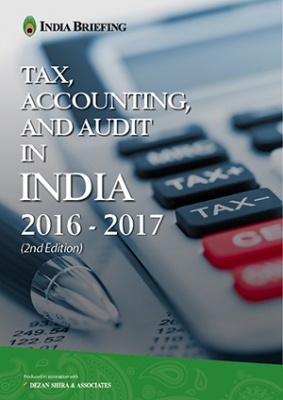
Tax, Accounting and Audit in India 2016-2017 (2nd Edition)
Published: August 2016Tax, Accounting, and Audit in India 2016 is designed to introduce the fundamentals of the tax regime as well as the critical accounting and auditing practices in India. As such, this comprehensive guide is ideal for not only businesses looking to enter the Indian market, but also for companies who already have a presence here and want to stay up-to-date with the most recent and relevant policy changes.
This publication has now been updated. Please click here for the latest edition.
No. of Pages: 70 pages
ISBN: 978-988-14804-8-4
India’s tax regime is complex. The multitude of taxes imposed by the central and state governments and regular changes in tax laws make it important for businesses to keep themselves up-to-date with the tax system in India.
While the tax system does present some challenges to businesses that are planning to enter or are currently in India, the Indian market also provides several rewards to businesses that are able to formulate a tax-efficient operating strategy.
The market, itself has great potential to grow. In spite of a global economic slowdown, India’s GDP growth has been among the highest in the world at 7.6 percent. This affirms that the economy is on the right track and has encouraged the government to push ahead with its reforms. The government remains committed to attract foreign investment in India and has also sought to implement several reforms to simplify the tax rules and bring them at power with global best practices.
2016, marks a watershed year for India with respect to tax reforms. The Goods and Services Tax (GST) was recently passed by the Indian parliament, which will remove several layers of taxation. The GST will remove the cascading effect of taxes, which has been seen a hindrance to the Ease of Doing Business in India. Tax, Accounting, and Audit in India 2016 critically evaluates the impact of such reforms and also explains the key tax protocols for businesses in India.
We discuss a range of pertinent issues for foreign businesses. The issues range from the most important tax dates for foreign companies, the key accounting practices to enable optimal business operations, how to conduct a successful audit, and the impact of the new tax reforms in India. In addition, we detail the various procedures and associated taxes for importing and exporting goods from India as well as the dispute resolution mechanisms for tax issues in India.
- India’s Tax Laws: An Introduction
- India’s Tax Laws: A History of Taxation in India
- India’s Corporate Tax
- Calculating CIT
- Tax Treatment of Fixed Assets
- Tax Incentives
- Infrastructure Sector
- Mineral Oil
- Deduction for Specified Businesses
- Undertakings in India’s North Eastern States
- Storage and Sale of Crude Oil
- Real Estate Investment Trusts (REITs)
- Tax Exemptions
- Minimum Alternate Tax
- Deferred Tax Assets and Liabilities
- Advance Tax
- Withholding Tax
- Person Treated as ‘Agent’
- Individual Income Tax
- Indirect Taxes
- Custom Duties
- Basic Customs Duty
- Additional Customs Duty
- Special CVD
- Anti-Dumping Duty and Safeguard Duty
- Protective Duty
- Import and Export Procedures
- Import Procedures
- Export Procedures
- Value Added Tax
- Central Sales Tax
- Service Tax
- Goods and Services Tax
- Excise Act
- Custom Duties
- International Taxation
- Transfer Pricing
- Specified Domestic Transactions
- Advance Pricing Agreement
- Country-by-country Reporting
- Transfer Pricing Documentation
- Auditing Practices in India
- Audit in India: The Basics
- Types of Audit
- Audit Reporting
- Accounting Index
- Core Concepts
- Standards
- Key Documents
- Miscellaneous

